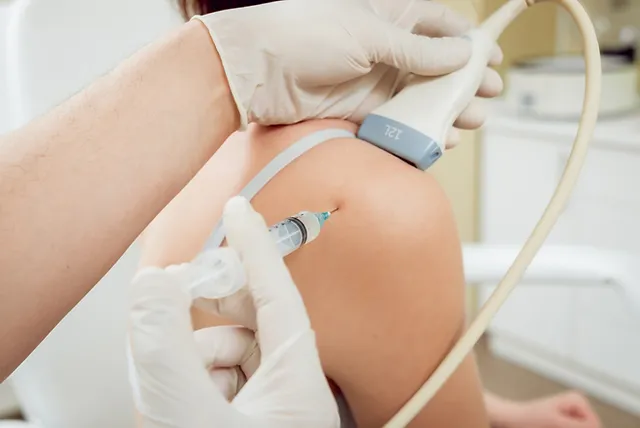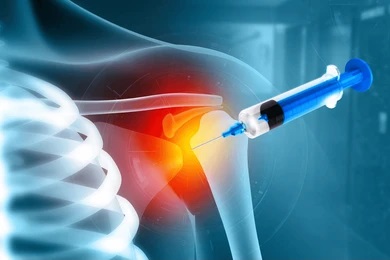Introduction
Ultrasound-Guided Injection Shoulder have revolutionized treating various shoulder conditions, providing precision, improved outcomes, and reduced pain. In this blog, we’ll delve into the essentials of this advanced technique, from the benefits and indications to the step-by-step procedure and aftercare.
Table of Contents
Understanding Shoulder Pain and Its Causes
Common Causes of Shoulder Pain
- Rotatory cuff injuries
- Frozen shoulder (Adhesive Capsulitis)
- Arthritis
- Bursitis
- Tendinopathy
- Fractures
- Sprain
- Strain
Why Ultrasound-Guided Injection Shoulder Are Used
- Pain relief
- Reducing inflammation
- Improving shoulder mobility
Section 2: What is an Ultrasound Guided Injection?
Explanation of Ultrasound – Guided Injection Shoulder
- Real-time imaging
- Improved accuracy
- Reduced complications
Advantages Over Traditional Methods
- Enhanced precision
- Better outcomes
- Lower risk of injury to surrounding tissues
Section 3: Indications for Ultrasound-Guided Injection Shoulder
When Are They Recommended?
- Persistent shoulder pain not responding to conservative treatments
- Diagnosis of specific conditions like bursitis, tendonitis, or arthritis
- Pre-surgical pain management
Contraindications
- Infection at the injection site
- Allergy to medications used in the injection
Section 4: Preparing for the Procedure
Patient Preparation
- Medical history review
- Discussing allergies and medications
- Explanation of the procedure
Equipment Needed
- Ultrasound machine
- Sterile gloves and drapes
- Local anesthetic
- Corticosteroid or other therapeutic agents
- Syringe and needels
Section 5: The Step-by-Step Procedure of ultrasound- guided injection shoulder

Step 1: Patient Positioning
- Sitting or lying down with the shoulder exposed
Step 2: Ultrasound Setup
- Application of ultrasound gel
- Placement of the ultrasound probe to visualize shoulder structures
Step 3: Site Selection and Cleaning
- Identifying the exact injection site
- Cleaning the skin with antiseptic solution
Step 4: Needle Insertion
- Real-time ultrasound guidance to direct the needle
- Ensuring accurate placement in the targeted area
Step 5: Injection
- Slow administration of the medication
- Monitoring patient comfort and response
Section 6: Post-Procedure Care

Immediate Aftercare
- Monitoring for adverse reactions
- Providing post-procedure instructions
Long-Term Aftercare
- Avoiding strenuous activities for a few days
- Following up with physical therapy if recommended
- Scheduling a follow-up appointment
Section 7: Potential Risks and Complications
Common Risks
- Pain at the injection site
- Temporary increase in pain
Rare Complications
- Infection
- Allergic reaction
- Tendon rupture
Section 8: Patient Testimonials and Success Stories
Real-Life Examples
- Brief stories of patients who benefited from the procedure
- Positive outcomes and improvements in quality of life
What other factors can influence how long you need to rest for after a steroid injection?
Injection Site: Joints: Steroid injections in large joints (like the knee or shoulder) might require more rest compared to smaller joints or soft tissues. Spine: Epidural injections often need more caution and rest. Type and Severity of Condition: Acute vs. Chronic: Acute injuries might need longer rest periods to avoid aggravation.Ultrasound-guided injection shoulder Severity: Severe inflammation or injury may necessitate more extended rest.
Type of Steroid Used:
Different steroids have varying potencies and duration of action, impacting the recovery period.
Individual Response: Sensitivity: Some individuals may experience more significant side effects, requiring longer rest.
Health Status: Overall health and presence of other medical conditions can influence recovery.
Activity Level: Physical Demands: Athletes or those with physically demanding jobs might need more rest compared to less active individuals.
Ultra Sound Guided Shoulder Injection Type of Activity: High-impact activities may require longer rest compared to low-impact ones.
Side Effects:
Side effects like pain, swelling, or dizziness can extend the needed rest period. Doctor’s Recommendations:
Adherence to specific medical advice tailored to the patient’s unique situation is crucial. Age and General Fitness:
Older adults or those with lower fitness levels may need longer rest periods to recover fully. Injection Technique:
The skill and precision of the person administering the Ultrasound guided injection can affect the recovery time. Taking these factors into account helps determine an appropriate rest period after a steroid injection, ensuring optimal recovery and effectiveness of the treatment.

Injection Technique
Accuracy of Injection:
- Target Area: Precise injection into the targeted area (e.g., joint space, tendon sheath) ensures the steroid is delivered where it’s needed most, potentially reducing the rest period.
- Avoiding Structures: Proper technique minimizes the risk of inadvertently damaging surrounding structures such as nerves, blood vessels, or cartilage, which can prolong recovery if injured.
What other factors can influence how long you need to rest after a steroid Ultrasound- guided injection shoulder ?
How many shoulder injections can I have?
As previously mentioned, the vast majority of injections carried out at Complete are one-off treatments.
- Degenerative conditions such as knee osteoarthritis
- Multiple conditions running concurrently such as osteoarthritis of the shoulder and a shoulder bursitis
- Frozen shoulder. Frozen shoulder is incredibly painful condition characterised by pain and stiffness in the shoulder. This condition may require a second injection.
- Some conditions such as rotator cuff tears or bursitis. If you respond positively to your first injection but symptoms still remain a second injection may be required to allow maximum pain free rehabilitation to occur.
Conclusion
Summarize the key points discussed in the blog, reiterate the benefits ofUltrasound-Guided Injection Shoulder and encourage readers to consult with their healthcare provider if they are experiencing shoulder pain.